Chess, often referred to as the “Game of Kings,” has a storied history that spans centuries.
Throughout this history, there have been countless grandmasters and brilliant minds who have graced the chessboard.
Narrowing down the list to the top 10 best players of all time is a challenging task, as each player brings their unique style and contribution to the game.
After adequate research, we settled with these names:
- Garry Kasparov
- Magnus Carlsen
- Bobby Fischer
- Emamuel Lasker
- Anatoly Karpov
- Jose Raul Capablanca
- Mikhail Tal
- Vladimir Kramnik
- Viswanathan Anand
- Paul Morphy
In this article, we will delve into the lives and achievements of these chess legends.
Garry Kasparov – The Beast Of Baku
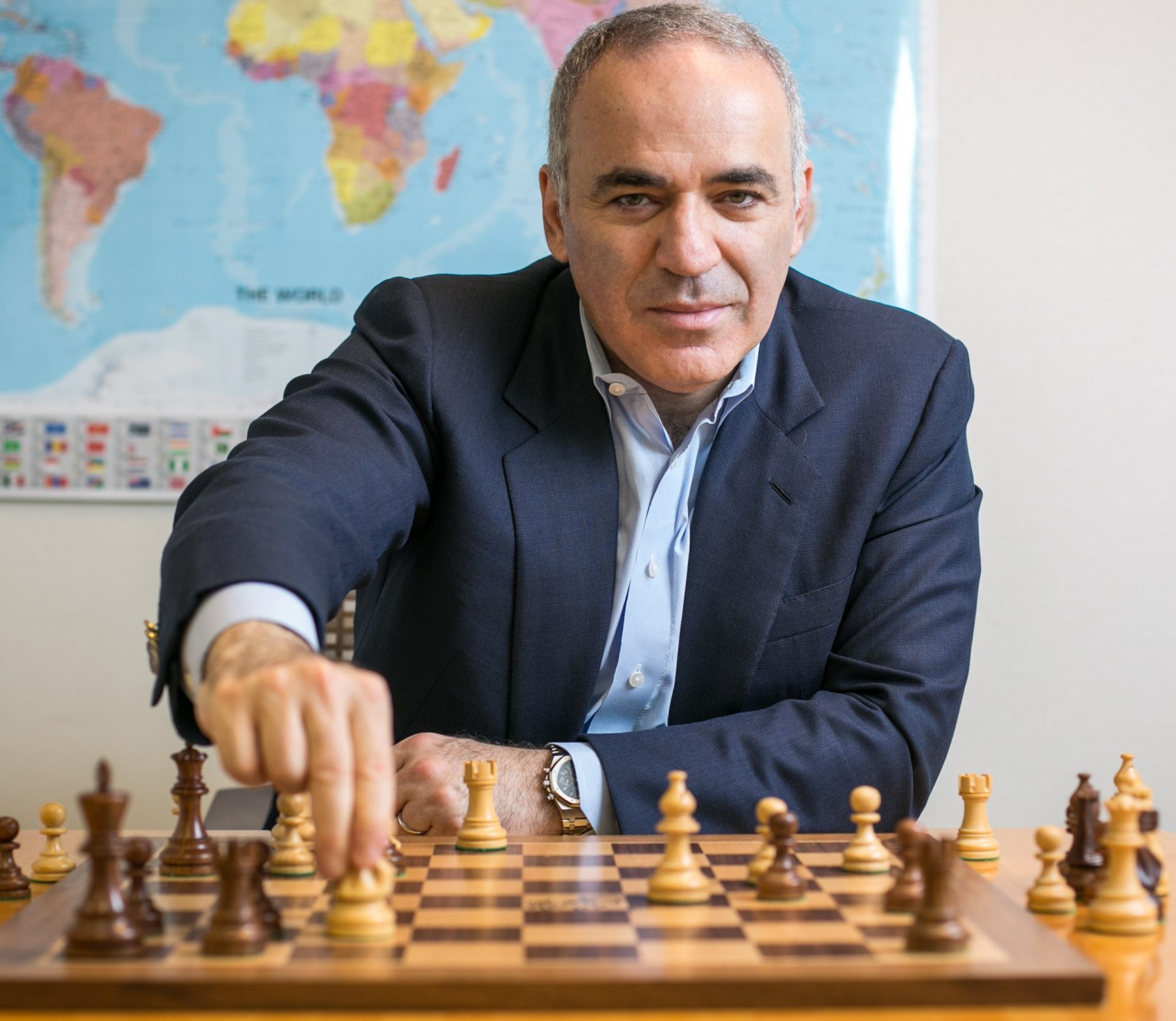
Garry Kasparov is considered by many to be the greatest chess player of all time.
As the former World Chess Champion for over 20 years, his skill, strategy and competitive drive have made him a legend in the chess world.
Kasparov began playing chess at the age of 6, showing a natural talent and passion for the game. By age 12, he had become the Soviet youth champion and went on to win multiple junior titles on his way to becoming the youngest World Chess Champion at age 22 in 1985.
His matches against chess greats like Anatoly Karpov were epic battles that received worldwide media attention and boosted the popularity of chess.
Kasparov’s attacking and tactical style of play, as well as his ability to calculate complex sequences far in advance, made him nearly unbeatable for decades.
Not one to rest on his laurels, Kasparov went on to have a successful career as a chess coach, author, political activist and speaker.
He saw chess as a strategic game that could be applied to other areas of life, especially business and politics.
Kasparov advocated for democracy and human rights, standing up against oppression in his native Russia.
While Kasparov’s chess accomplishments alone cement his status as one of the best chess players ever, his passion for life, continual quest for challenges and desire to improve the world around him make him an inspiration.
The chess master who once famously said, “Chess is mental torture” has given so much to the game that has defined his life.
Magnus Carlsen – The Current World Number One
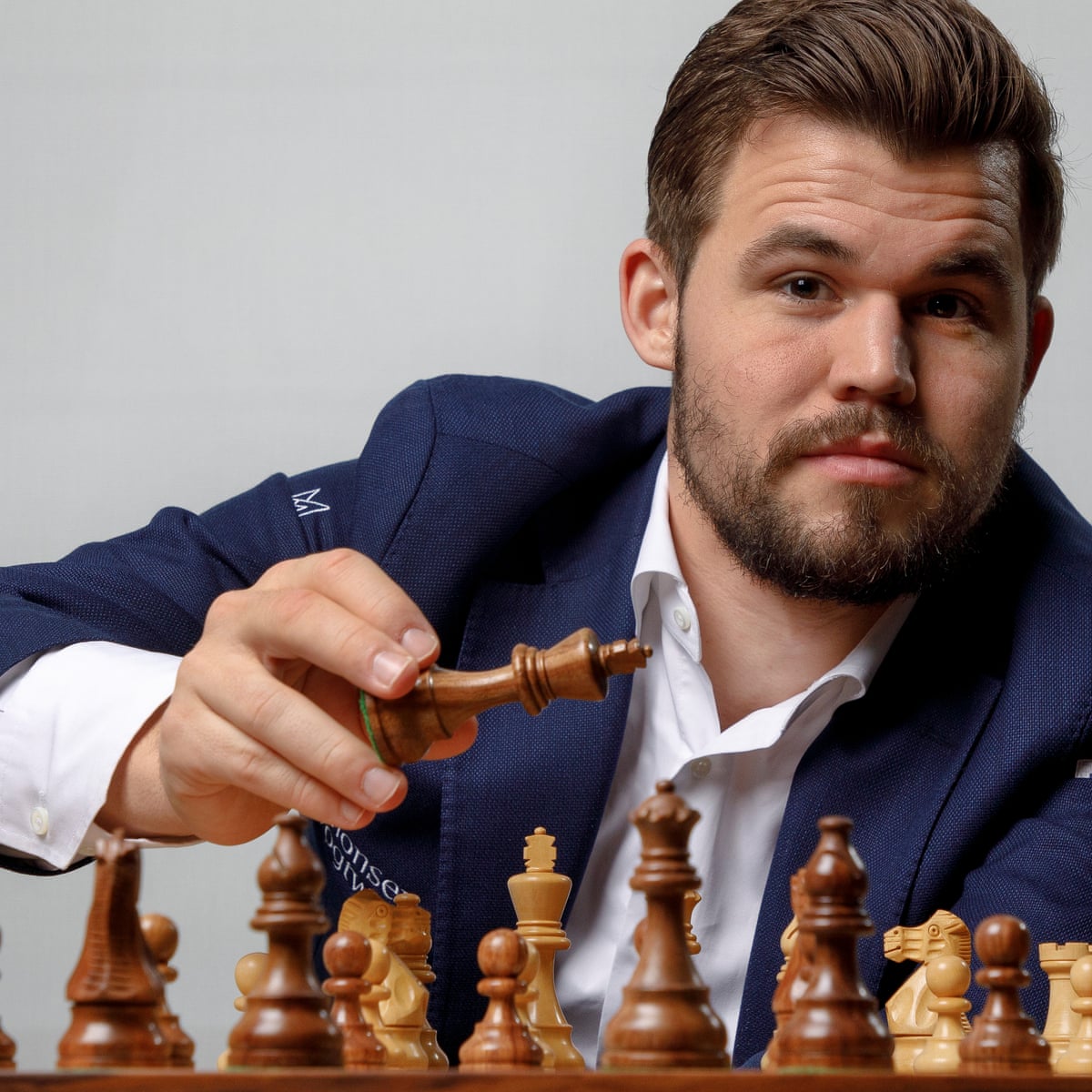
Magnus Carlsen is a Norwegian chess grandmaster who has made an indelible mark on the world of chess.
Born on November 30, 1990, in Tonsberg, Norway, Carlsen displayed his exceptional talent for the game at a very young age.
He earned the title of Grandmaster at the age of 13, making him one of the youngest grandmasters in chess history.
Carlsen’s rise to prominence in the chess world was meteoric. In 2010, at the age of 19, he became the youngest player to be ranked World No. 1, a position he holds till date.
In 2013, he achieved the pinnacle of his career by winning the World Chess Championship, dethroning Viswanathan Anand.
Carlsen’s playing style is characterized by flexibility and adaptability. He has a vast opening repertoire, and he’s equally comfortable in sharp, tactical battles as he is in maneuvering strategically complex positions.
This versatility has made him a formidable opponent, as he can tailor his approach to exploit his opponent’s weaknesses.
One of Carlsen’s distinctive strengths is his endgame prowess. He is known for grinding out wins in seemingly drawn positions, demonstrating exceptional patience and an ability to create winning chances where none seem to exist.
His deep understanding of chess has earned him the nickname “The Mozart of Chess.“
Outside of competitive play, Magnus founded the Play Magnus app, which allows players of all levels to take on a digital Magnus at different ages.
He has also modeled for various fashion brands like G-Star Raw, proving he is a man of many talents. However, chess remains his greatest passion.
Magnus continues to push the boundaries of chess mastery in pursuit of an ever-higher rating and cementing his status as the greatest player of all time.
Bobby Fischer – The Enigmatic American Chess Genius
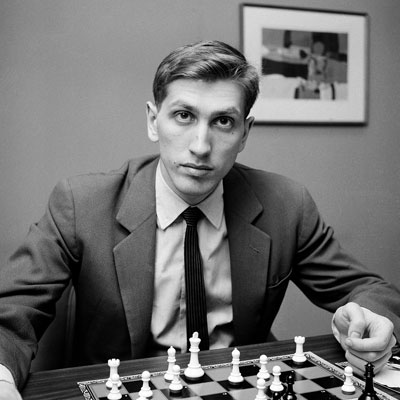
Bobby Fischer was a chess prodigy and true American legend.
Born in Chicago in 1943, Bobby learned to play chess at age 6 and was already competing in tournaments by 8. His raw talent and passion for the game were evident early on.
Teenage Champion
At just 15, Bobby became the youngest U.S. chess champion. His star rose fast, winning eight U.S. titles in a row.
In 1972, Bobby cemented his status as the world’s best player, defeating Boris Spassky of the Soviet Union to become World Chess Champion.
The epic match against Spassky was seen as a symbolic battle between the Soviet Union and the United States during the Cold War.
When Bobby won, he became an instant American hero. His eccentric personality and brash confidence made him a pop culture icon.
His stunning victory over Spassky gave the Western world renewed hope that the Soviets were not unbeatable.
Sadly, Bobby descended into paranoia and reclusiveness later in life. However, his contributions to chess – demonstrating the importance of an aggressive, fighting style of play and expanding opening theory – will live on forever. Many consider him the greatest natural chess talent ever.
While his life remains somewhat enigmatic, Bobby Fischer’s accomplishments at such a young age will likely never be matched.
His games are still studied by chess players today, serving as a blueprint for creative attack and defense. There may never be another American chess prodigy like the legend of Bobby Fischer.
Emanuel Lasker – The Longest Reigning World Champion
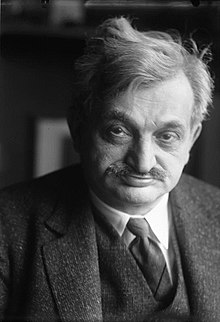
Emanuel Lasker, born on December 24, 1868, in what is now Poland, was a German mathematician, philosopher, and the second World Chess Champion.
His remarkable tenure as the chess champion spanned 27 years, from 1894 to 1921, making him the longest-reigning world champion in chess history.
Lasker’s contributions to chess extended far beyond his record-breaking championship reign.
His ascent to the World Chess Championship began in 1894 when he defeated Wilhelm Steinitz, the reigning champion, in a match.
This victory marked the beginning of his long reign, during which he successfully defended his title against a series of formidable challengers.
What set Lasker apart was not just his chess prowess but also his pioneering work in the psychology of chess. He believed that chess was not just about moves on the board but also a psychological battle between opponents.
His deep understanding of human psychology played a significant role in his success as he often outmaneuvered opponents by creating unbalanced and uncomfortable positions.
Lasker’s versatility as a chess player was a hallmark of his career. He excelled in both tactical and positional play, making it challenging for opponents to prepare for his games.
His ability to switch between different styles of play showcased his adaptability and chess acumen.
Beyond his games, Lasker made substantial contributions to chess theory and opening play. His book “Common Sense in Chess” and his annotations in chess magazines were highly regarded and influenced generations of chess players.
In addition to his chess pursuits, Lasker was a polymath. He obtained a Ph.D. in mathematics and made significant contributions to the field of mathematics, particularly in the areas of algebra and philosophy.
His interests also extended to philosophy and the philosophy of mathematics, demonstrating his intellectual breadth.
Emanuel Lasker passed away on January 11, 1941, in New York City.
People who love chess and those who study it still celebrate and learn from his contributions to the game. He was a great chess player and champion, and his ideas and thoughts about chess are still important today.
Anatoly Karpov – The Boa Constrictor
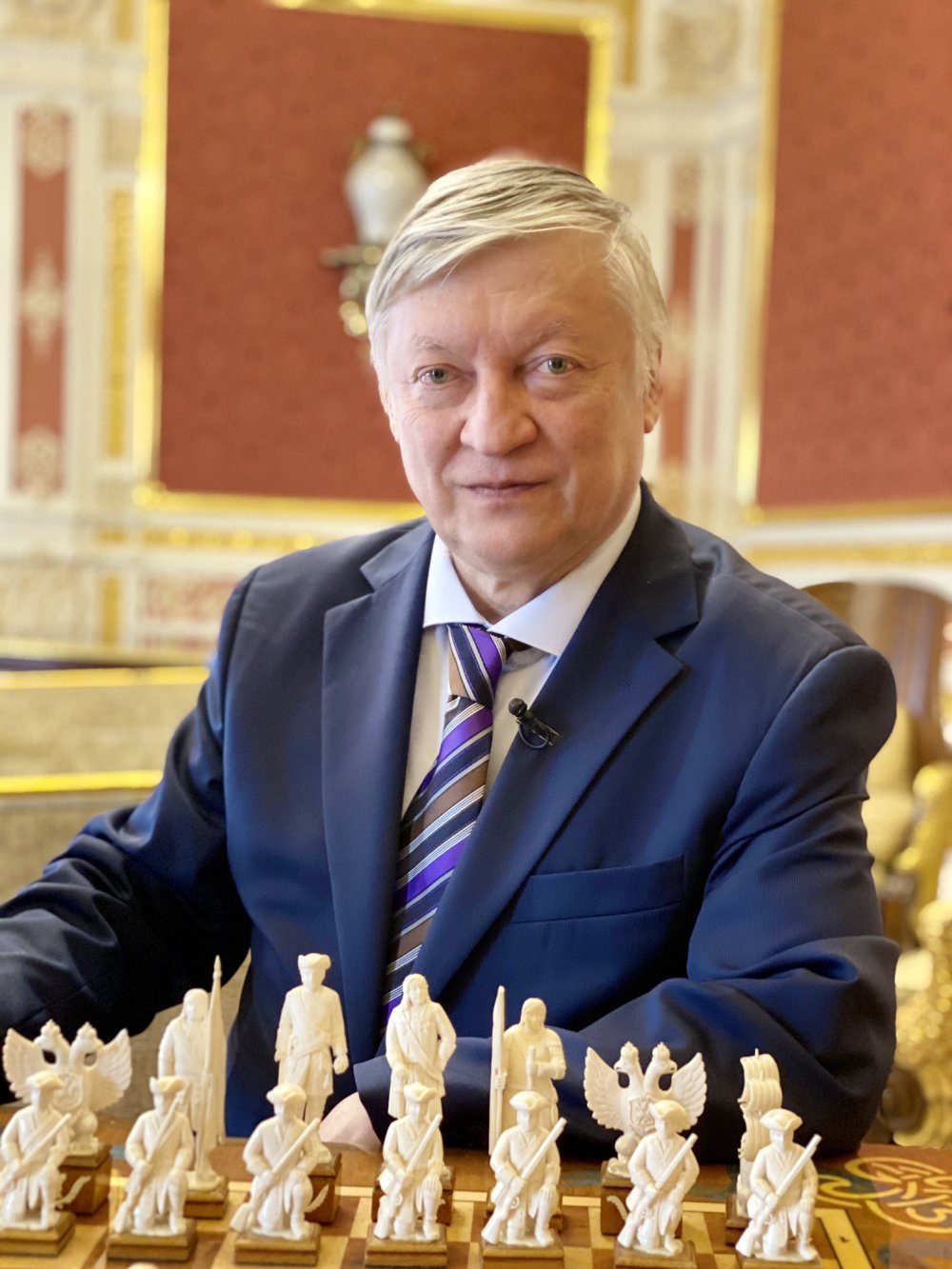
Anatoly Karpov dominated chess in the 1970s and 1980s, holding the world championship title for a decade.
As Kasparov’s biggest rival, Karpov challenged him for the world title five times. Though he only won once, Karpov proved a formidable opponent.
Karpov learned chess at the age of 4 and was a grandmaster by the age of 19.
His positional style of play, characterized by slow maneuvering and the accumulation of small advantages, earned him the nickname “The Boa Constrictor.” He would slowly strengthen his position and strangle his opponents.
In 1975, Karpov became the youngest world champion at the time after Bobby Fischer refused to defend his title.
Karpov held onto the championship for 10 years without defeat. His reign came to an end in 1985 when Garry Kasparov, a brash young star, defeated him.
The Karpov-Kasparov rivalry became one of the greatest in chess history. They battled in five world championship matches throughout the 1980s, though Karpov only regained the title once in 1993.
Their clashes were epic, attracting sponsors and spectators. Kasparov’s aggressive and tactical style contrasted with Karpov’s maneuvering, leading to clashes of “fire and ice.”
Though overshadowed by Kasparov, Karpov deserves recognition as one of the greatest players of all time. At his peak, he was nearly unbeatable.
Karpov won over 160 tournaments in his career, held the world No. 1 ranking for 90 months, and maintained an astonishing +700 score against the world’s top players.
His games are still studied today for their brilliance and as examples of his signature gradual accumulation of advantages through precise positioning and Zen-like patience.
Off the board, Karpov was also an influential voice in Russian politics and remains a controversial figure.
Still, his chess legacy lives on as a model of excellence, professionalism and sporting achievement.
You can read more about Anatoly Karpov here.
Jose Raul Capablanca – The Chess Machine
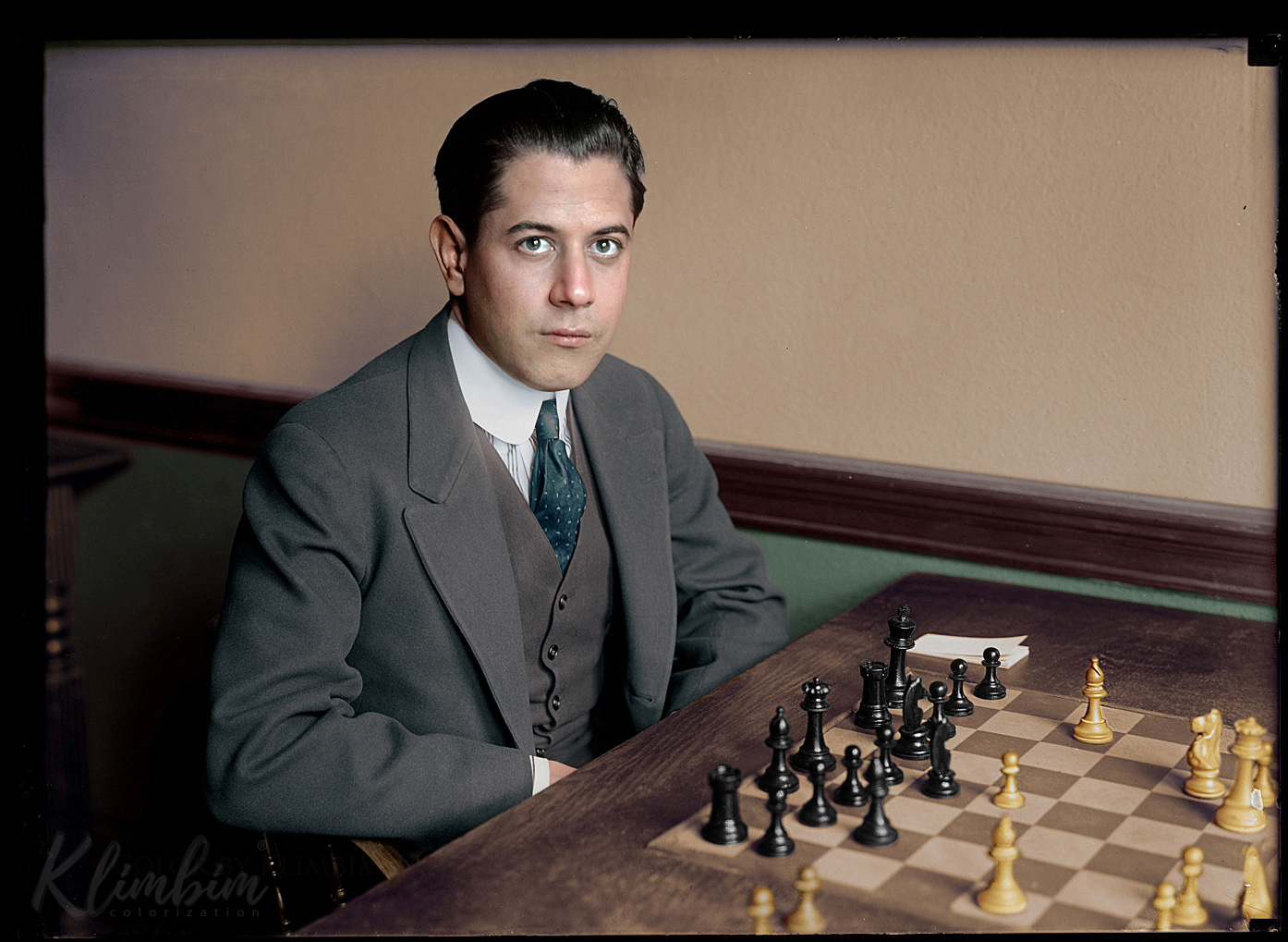
Jose Raul Capablanca was a Cuban chess player who was world chess champion from 1921 to 1927. He was a chess prodigy and one of the greatest natural talents in chess history.
Capablanca learned the rules of chess at the age of four by watching his father play. He quickly became an expert and by the age of thirteen won a match against Cuban champion Juan Corzo.
His talent and skill seemed almost effortless. He was known for his patience, endurance, and his ability to see many moves ahead.
Capablanca had a gift for logical and strategic thinking as well as intuition. He approached each game with a fresh perspective, focusing on the current position rather than following standard opening theory or endgame positions he had memorized.
Some of Capablanca’s most famous games were his wins against Marshall, Lasker and Alekhine.
He won several strong tournaments during the early 1920s and claimed the world chess championship in 1921 by defeating Lasker.
Capablanca reigned undefeated for six years before losing to Alekhine in 1927. Though he continued to compete for over a decade more, he never regained the world title due to unsuccessful attempts to arrange a rematch.
Capablanca’s style and mastery of chess fundamentals influenced many great players who came after him.
His games are still studied today by chess students who want to learn strategy, tactics and endgame technique.
Mikhail Tal – The Magician From Riga
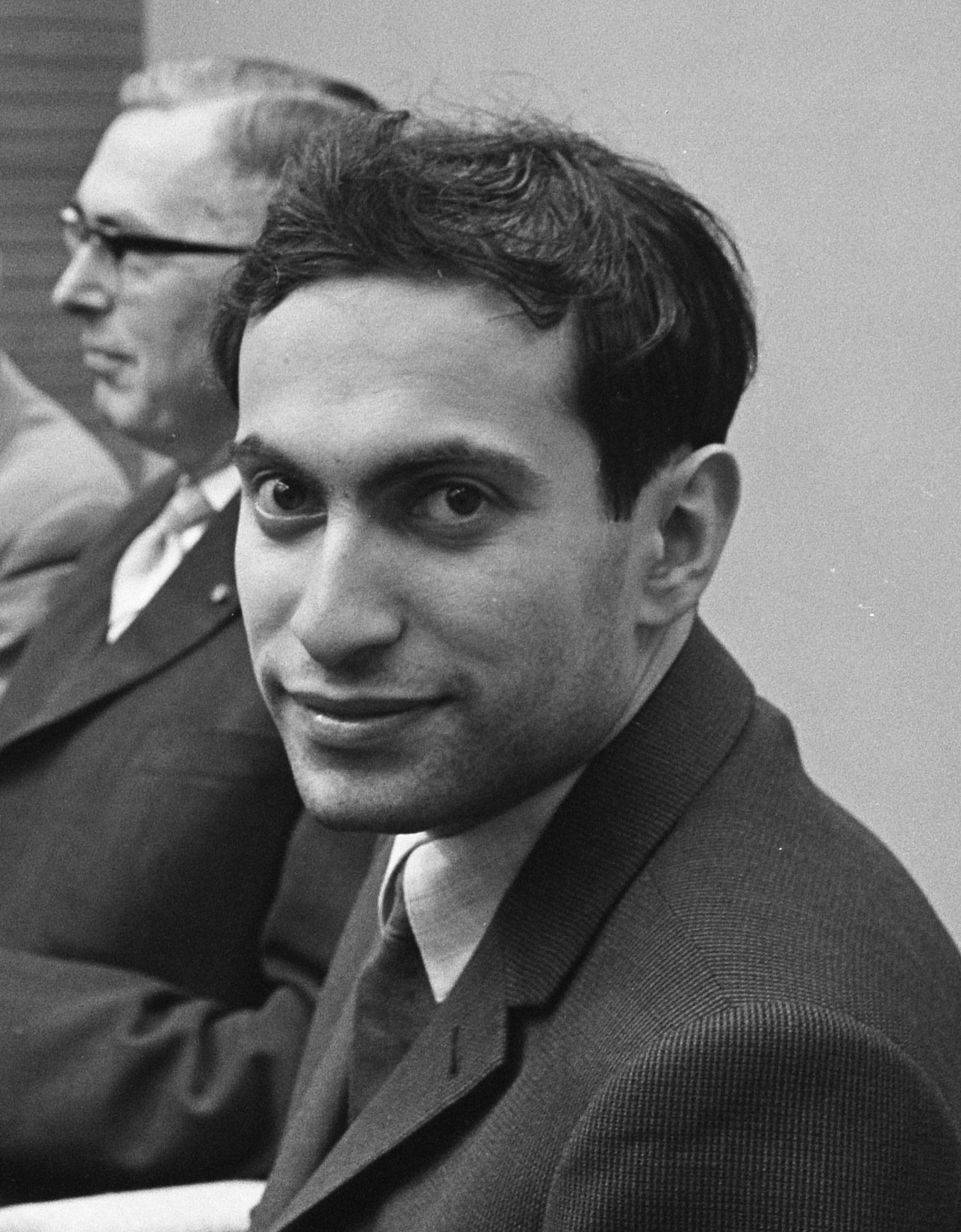
Mikhail Tal, nicknamed “The Magician from Riga,” was a Latvian chess Grandmaster and the seventh World Chess Champion. Known for his aggressive and tactical style, Tal was one of the most exciting players to watch.
Tal learned to play chess at age 8 and was competing in tournaments by age 11. His first major victory came at age 16 when he won the Latvian Chess Championship.
Tal’s rise in the chess world was meteoric. By age 20, he earned the title of Grandmaster, making him the youngest GM at the time.
In 1960, Tal defeated Mikhail Botvinnik to become the seventh World Chess Champion at the age of 23.
As champion, Tal continued to employ his signature tactical style, described as “wild, original, and full of imagination.” His reign lasted just one year, as Botvinnik regained the title in a rematch.
Though no longer world champion, Tal remained a formidable player for decades. He won four consecutive Soviet championships from 1972 to 1975.
On the global stage, Tal won many international tournaments, including the Montreal 1979 Tournament of Stars where he edged out Bobby Fischer.
Tal’s daring and romantic style made him a fan favorite and inspiration to younger players. Tragically, his career was cut short in his 40s due to declining health.
But in his lifetime, Tal had a profound influence on chess. His creative genius and passion for attack reshaped theories of how the game should be played at the highest levels.
Vladimir Kramnik – The Man Who Dethroned Kasparov
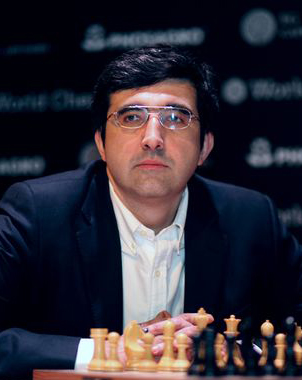
Vladimir Kramnik is considered by many to be one of the best chess players of all time.
In 2000, he achieved what was thought nearly impossible – he defeated Garry Kasparov to become the 14th World Chess Champion.
Kramnik started learning chess at the age of 4 from his father. His immense talent was apparent early on.
In 1991, at just 15 years old, he earned the title of International Grandmaster, making him the youngest person ever to achieve the title at the time.
In 2000, Kramnik got the chance to prove himself against the dominant world champion Kasparov. In a 16-game match, Kramnik defeated Kasparov and ended his 15-year reign as champion.
Kramnik’s victory shocked the chess world and cemented his status as one of the all-time greats.
As world champion, Kramnik successfully defended his title three times. His reign lasted until 2007 when he was defeated by Viswanathan Anand.
Known for his deep understanding of strategy and endgames, Kramnik continued to compete at the highest levels of chess for over 20 years.
Some of Kramnik’s major accomplishments include:
- World Chess Champion from 2000 to 2007
- Chess Olympiad gold medalist in 1992, 2004
- World Cup Champion in 2019
- Ranked world No. 1 for several months in 1996 and 2000
Though Kramnik officially retired from professional chess in 2019, his impact on the game will endure.
Viswanathan Anand – The Tiger Of Madras
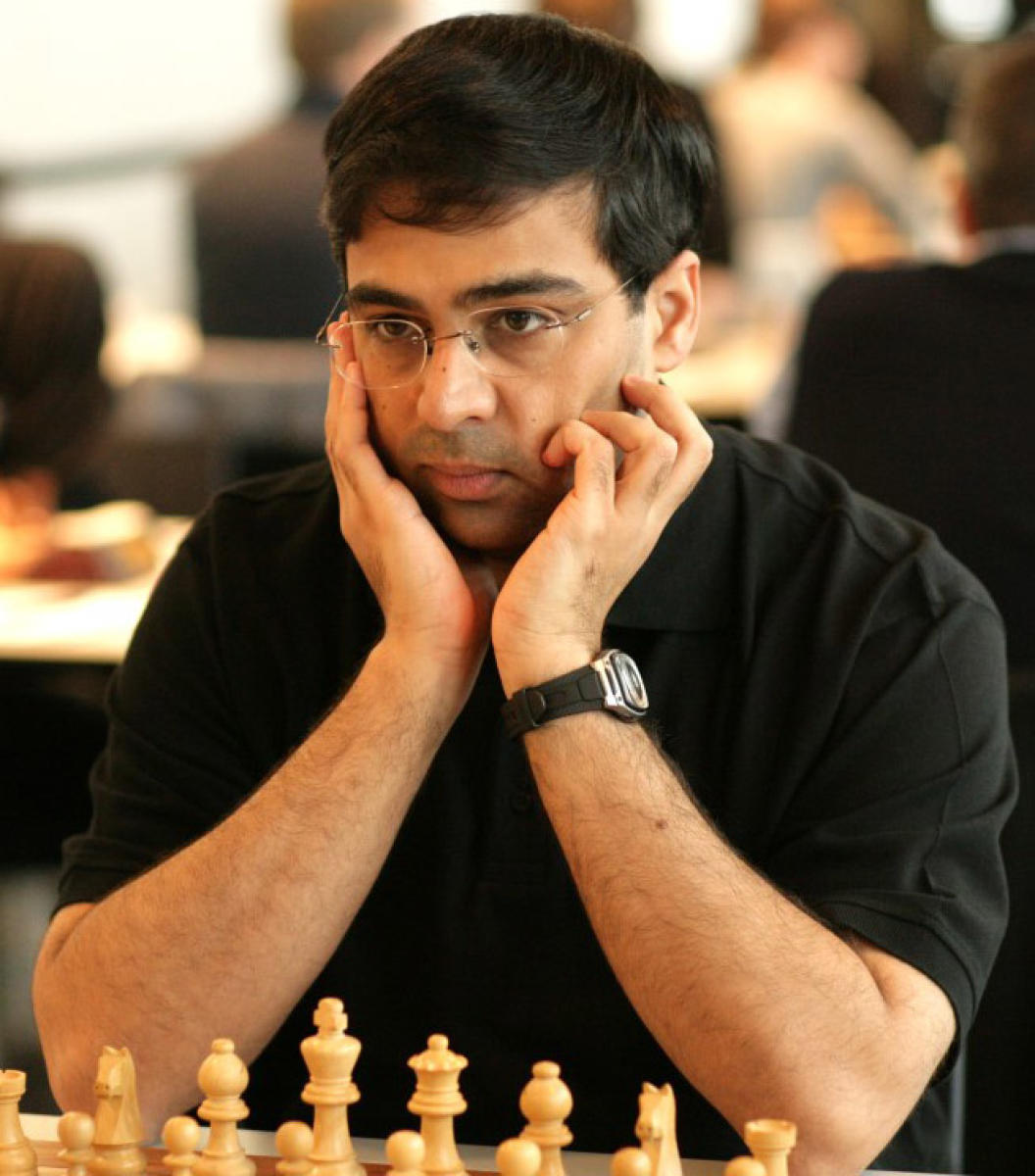
Viswanathan Anand, also known as Vishy, is considered by many to be India’s greatest chess legend.
Born in 1969 in Chennai, he became India’s first grandmaster at the age of 18 and went on to dominate the chess world for over two decades.
Anand won his first world championship in 2000, defeating Alexei Shirov to claim the FIDE World Chess Championship.
This victory at the age of 30 made him the first Asian to win a world chess title. Anand successfully defended his title in knockout matches three times before the championship was discontinued.
When the “classical” World Chess Championship reunified in 2006, Anand had the chance to prove himself against the world’s best players in a series of matches.
He won the title in 2007 by defeating Vladimir Kramnik and then defended it in 2008 against Kramnik and in 2010 against Veselin Topalov.
Anand lost his title in 2013 to 22-year-old world No. 1 Magnus Carlsen but earned a rematch in 2014.
Though he failed to reclaim the championship, Anand’s longevity and continued competitiveness against players half his age cemented his status as an all-time great. At age 53, Anand remains one of the world’s best players.
Anand’s chess talent, sportsmanship, and status as a national hero have inspired generations of Indian chess players.
With dedication and hard work, he overcame the notion that chess was a “Western” game and paved the way for the rising stars of Indian chess today.
Today, we see other top indian players like Vidit, Prag, Gukesh and Vaishali following in that path.
Anand’s many accomplishments and global impact make him a deserving inclusion on any list of the greatest chess players of all time.
Paul Morphy: The Pride And Sorrow Of Chess
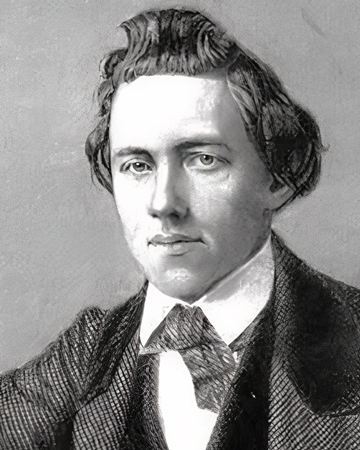
Paul Morphy, born on June 22, 1837, in New Orleans, Louisiana, was an American chess prodigy and one of the most remarkable figures in the history of chess.
Although his active chess career was relatively short, spanning from the mid-1850s to the early 1860s, Morphy’s exceptional talent and contributions to the game left an indelible mark.
Morphy’s chess journey began with an early aptitude for the game, learning it from his family at a young age. His extraordinary ability quickly became apparent as he swiftly mastered the intricacies of chess.
His breakthrough came in 1857 during the First American Chess Congress in New York, where he defeated several strong players, including Louis Paulsen and Alexander Meek, establishing himself as a formidable force in the chess world.
What truly catapulted Morphy into international acclaim was his European tour in 1858.
Here, he faced and defeated many of the leading European chess players, earning widespread acclaim. Notable victories against Johann Löwenthal and Howard Staunton solidified his reputation.
Morphy’s playing style was characterized by aggressive, tactical brilliance. He possessed an exceptional ability to calculate variations and exploit weaknesses in his opponent’s positions. His games were marked by rapid development and a keen sense of initiative.
Although he never officially held the title of World Chess Champion, Morphy was widely recognized as the world’s leading player during his era, earning him the title of the unofficial world champion.
Despite his immense talent and success, Morphy’s chess career was relatively brief. He retired from competitive chess in the early 1860s due to personal reasons and never defended his unofficial world champion title. It is for this reason that Morphy is referred to as the pride and sorrow of chess.
Paul Morphy’s contributions to chess theory and his remarkable games continue to be studied and admired by chess enthusiasts and players worldwide. His ideas and combinations remain a source of inspiration for generations of chess players.
In his later years, Morphy lived a relatively private life, battling mental health issues. Tragically, he passed away on July 10, 1884, at the age of 47.
Nevertheless, Paul Morphy’s extraordinary talent and his impact on the chess world during his prime solidified his status as one of the greatest chess players in history.




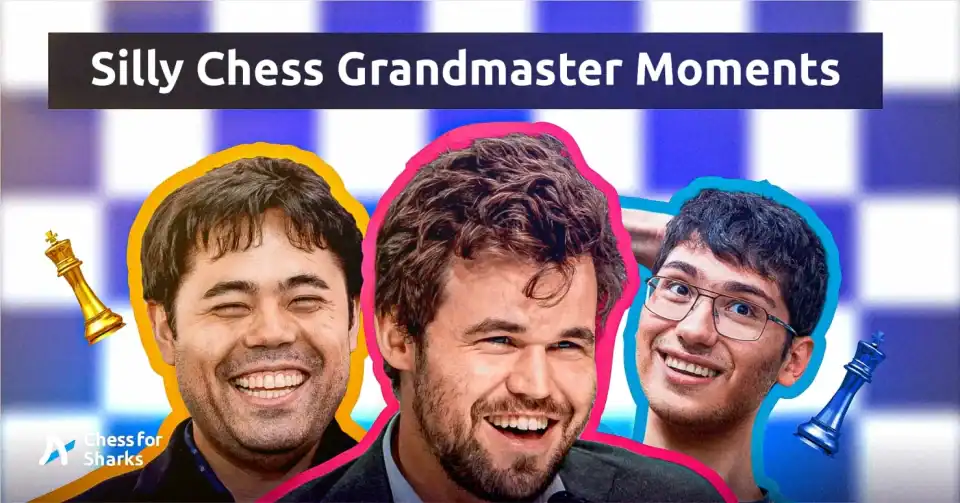

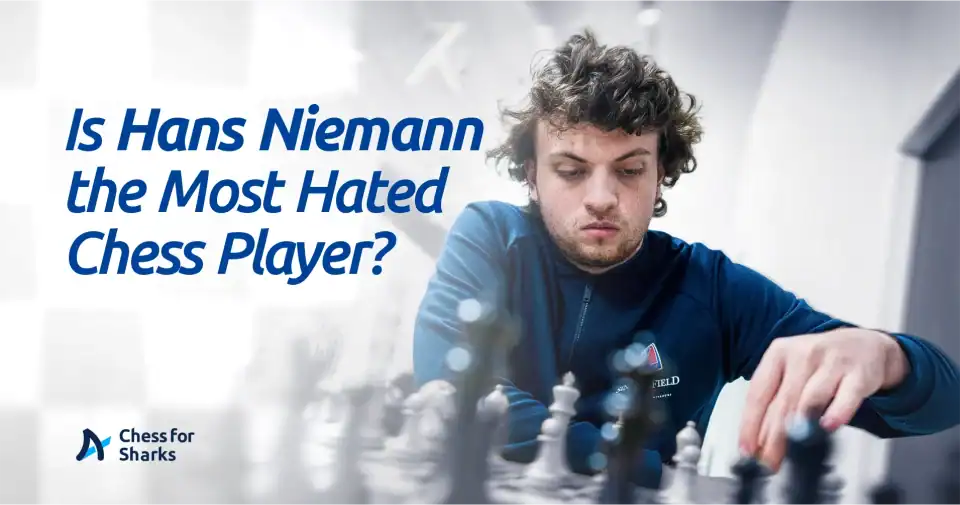
join the conversation